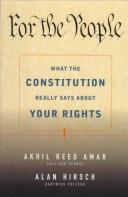A strange sight, indeed: Popular sovereignty is taken seriously in a discussion of the Constitution. In this populist interpretation of the Constitution, Amar (Law/Yale) and Hirsch (a freelance writer and graduate of Yale Law School) insist that “we the people” denotes a collective entity, not a collection of individuals. They contend that viewing the Constitution “through the prism of the individual” has overemphasized the majority-rule/minority-rights debate and has been reinforced by the tendency to dissect discrete passages rather than interpret the document as a whole. We have come to assume that “rights” refers to individual rights, ignoring the politically more fundamental conception of rights held by the public as a whole. Amar and Hirsch respond to this deficiency by exploring the implications of a broad reading (not to be confused with loose construction) of the Constitution regarding constitutional amendment, juries, and the military. In this volume’s most controversial argument, the authors maintain that the specific procedures for amendment outlined in the Constitution do not preclude direct amendment by majority vote of the populace. The logic is inescapably democratic: If popular sovereignty is meaningful, how could the people be deprived of the right to amend the Constitution? Similarly, Amar and Hirsch find inalienable rights applicable to juries and the military, with straightforward implications. Peremptory challenges eliminating a candidate from jury service, for example, are not consistent with either the citizen’s right to serve or the public’s right to try the accused. Access to military service is no less a citizen’s right or a public concern, consequently the authors argue that blocking the entry of gays or women into the ranks is indefensibleif the rights of “we the people” are truly paramount. Consistent and contentious throughout, Amar and Hirsch offer an analysis that should threaten both liberals and conservatives with a commitment to popular sovereignty both like to avoid. — Copyright ©1998, Kirkus Associates, LP. All rights reserved.

| Attachment | Size |
|---|---|
| amar_2002.pdf | 179.05 KB |
- Login to post comments
